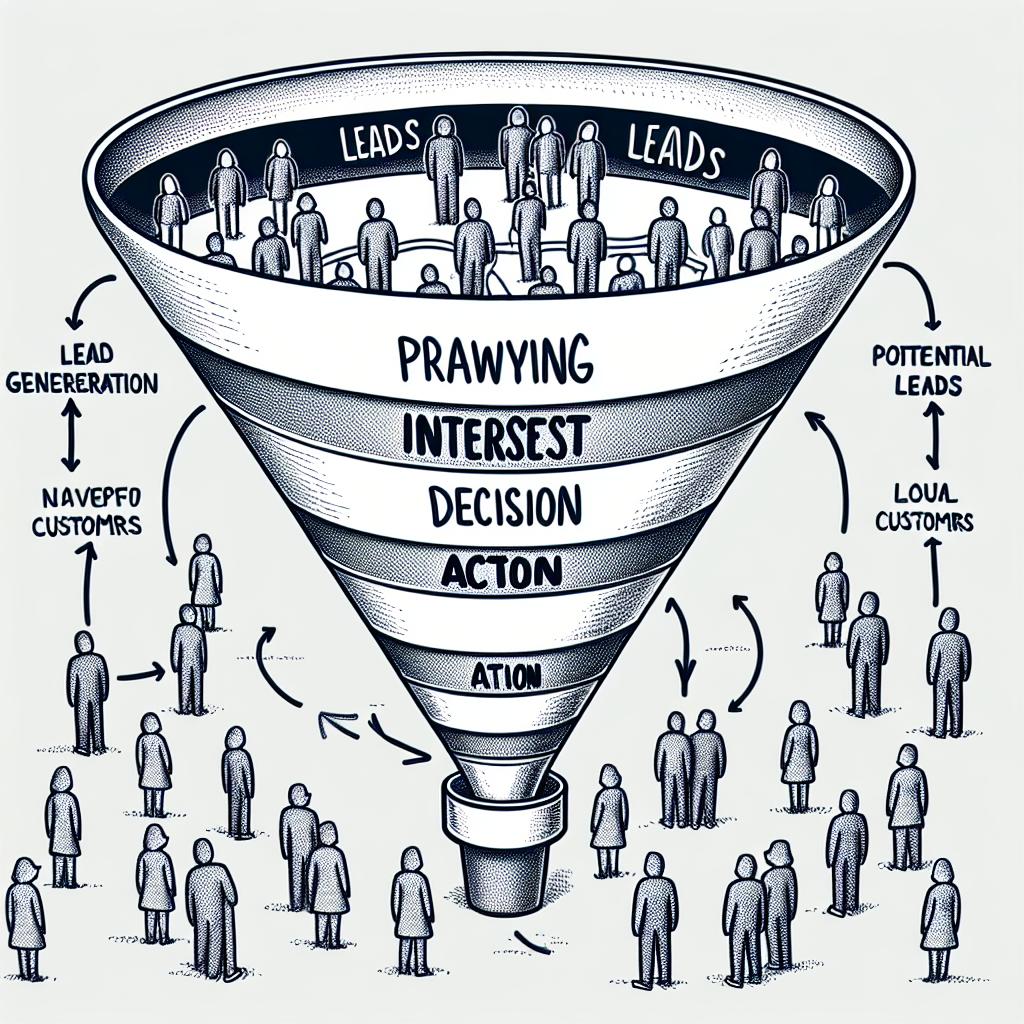How to Build an Effective Digital Marketing Funnel for Lead Generation
Creating an effective digital marketing funnel is essential for any business aiming to generate leads consistently. A well-structured funnel not only attracts potential customers but also guides them through the buying process until they become loyal clients. This article will delve into the components necessary for building a successful digital marketing funnel, methods for implementation, and strategies for continuous improvement.
Understanding the Digital Marketing Funnel
The digital marketing funnel is a visual representation of the customer’s journey from initial awareness through to engagement and conversion. The funnel is typically divided into three main stages: Top of Funnel (ToFu), Middle of Funnel (MoFu), and Bottom of Funnel (BoFu). Each stage requires specific strategies and tactics to move prospects closer to a purchase decision.
Top of Funnel (ToFu)
At the top of the funnel, the goal is to create awareness. This is accomplished through various marketing channels that reach a broad audience. Potential customers may not yet know about your brand or product. The focus here is on:
- Content Marketing: Deploy blogs, infographics, podcasts, and videos to provide valuable information.
- Social Media: Utilize platforms like Facebook, Instagram, and LinkedIn to engage with a wider audience.
- Paid Advertising: Invest in PPC and display ads to capture attention outside of organic reach.
At this stage, the content must be engaging and informative to foster initial interest. Building brand awareness and trust is crucial.
Middle of Funnel (MoFu)
Once leads express interest, they enter the middle stage. Here, the focus shifts to nurturing relationships and providing value. This can be accomplished through:
- Email Marketing: Send newsletters or targeted campaigns to keep leads engaged and informed.
- Webinars and Demos: Provide deeper insights into your offerings, allowing potential customers to learn more and ask questions.
- Case Studies and Testimonials: Share success stories to build credibility and trust.
The MoFu stage is critical for demonstrating how your product meets the specific needs of your audience, thereby positioning your solution as the best choice.
Bottom of Funnel (BoFu)
At the bottom of the funnel, leads are ready to make a purchase. Here, the focus is on conversion. Effective strategies in this stage include:
- Strong Calls to Action (CTAs): Use persuasive language and clarity to prompt the next steps.
- Promotional Offers: Discounts, trials, or limited-time offers can encourage immediate purchases.
- Personal Assistance: Offer consultations or support to address any remaining hesitations.
The transition from interest to purchase is delicate and requires confidence-building strategies to finalize the conversion.
Key Components of an Effective Funnel
1. Target Audience Identification
Understanding your target audience is paramount. Conduct thorough research to identify demographics, preferences, and challenges. This knowledge enables tailored messaging that resonates with potential leads.
2. Engaging Content Creation
Quality content is the backbone of a successful funnel. Invest in creating valuable resources that inform, entertain, and engage your audience.
3. Strategic Channel Selection
Choose the channels that best reach your target audience. Consider social media, blogs, email, and PPC based on where your audience spends their time.
4. Powerful CTAs
Clear and compelling calls to action are integral at all funnel stages. Ensure that CTAs are positioned strategically throughout your content to guide prospects toward the next step.
5. Lead Magnets
Offer free resources (eBooks, whitepapers, checklists) in exchange for contact information. This strategy helps to build your email list while providing value upfront.
6. Email Automation
Utilize email automation for personalized communication. Segment your leads based on behavior and preferences for targeted messaging.
Building Your Funnel: Step-by-Step Process
Step 1: Define Objectives
Start by defining clear objectives for your funnel. Are you looking to drive sales, increase brand visibility, or gather customer feedback? Pinpointing your goals will guide your funnel strategy.
Step 2: Map the Customer Journey
Outline the entire customer journey from awareness to conversion. Identify touchpoints where potential leads interact with your brand, and create content tailored to each stage.
Step 3: Create Content and Resources
Develop relevant and high-quality content designed to address your audience’s pain points. Ensure your messaging aligns with their journey through the funnel.
Step 4: Implement Tracking and Analytics
Use analytics tools to monitor funnel performance. Track metrics such as click-through rates, conversion rates, and engagement levels to gain insights.
Step 5: Test and Optimize
Continuously test various elements of your funnel—from email subject lines and CTA placements to different types of content. Analyze outcomes and optimize for better performance.
Conclusion
Building an effective digital marketing funnel for lead generation involves strategic planning and execution. By focusing on your audience’s journey, producing valuable content, and nurturing relationships through targeted communication, you can create a funnel that not only attracts leads but also drives sales. With consistent testing and optimization, you can refine your strategies to yield the best results and ensure sustained growth.
Embrace the digital landscape with an informed approach, and watch as your lead generation efforts transform into a powerful source of business growth.









